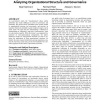Free Online Productivity Tools
i2Speak
i2Symbol
i2OCR
iTex2Img
iWeb2Print
iWeb2Shot
i2Type
iPdf2Split
iPdf2Merge
i2Bopomofo
i2Arabic
i2Style
i2Image
i2PDF
iLatex2Rtf
Sci2ools
DGO
2009
2009
"Integrated" and "transcendent" e-government: keys for analyzing organizational structure and governance
As e-government enters the "transformation" phase, public authorities face major challenges in terms of governance and leadership. The present article consolidates prior research related to organizational structure and governance, and provides an analytical framework intended to guide empirical enquiry and to orient action. We argue that our understanding is enhanced by distinguishing an "integration" stage and a "transcendence" stage of e-government maturity. While the former is accompanied by a profusion of inter-organizational arrangements, the latter's distinctive feature are inter-personal networks. In order to appraise the implications of these organizational structures, we identify the main reasons behind their growing importance, analyze the ways they create value, and lay the foundations of a normative approach for the choice of governance structures. Categories and Subject Descriptors K.4.1 [Computers and Society]: Public Policy Issues; K.4...
Consolidates Prior Research | DGO 2007 | DGO 2009 | E-government Maturity | Organizational Structures |
| Added | 09 Nov 2010 |
| Updated | 09 Nov 2010 |
| Type | Conference |
| Year | 2009 |
| Where | DGO |
| Authors | Beat Estermann, Reinhard Riedl, Alessia C. Neuroni |
Comments (0)

